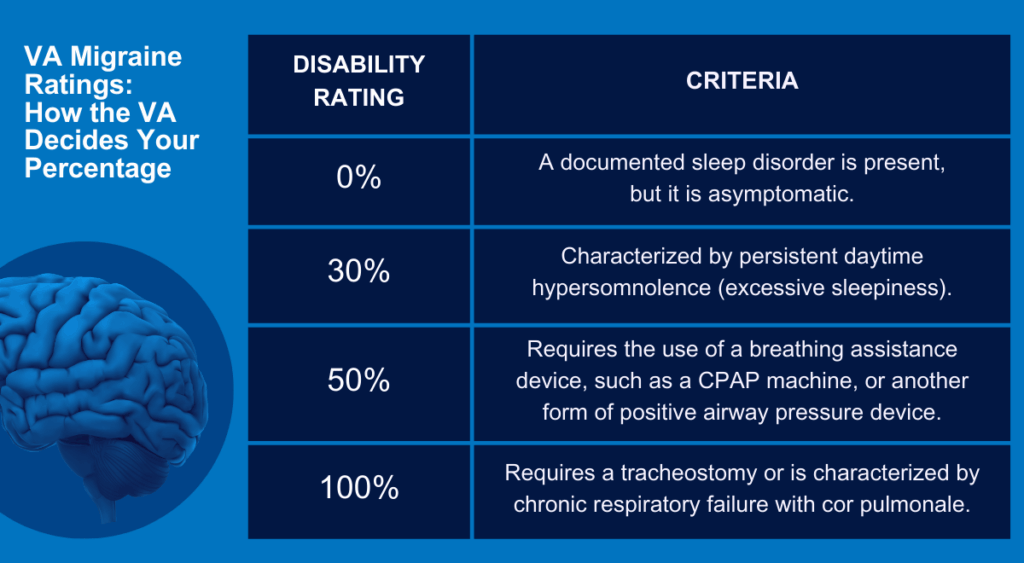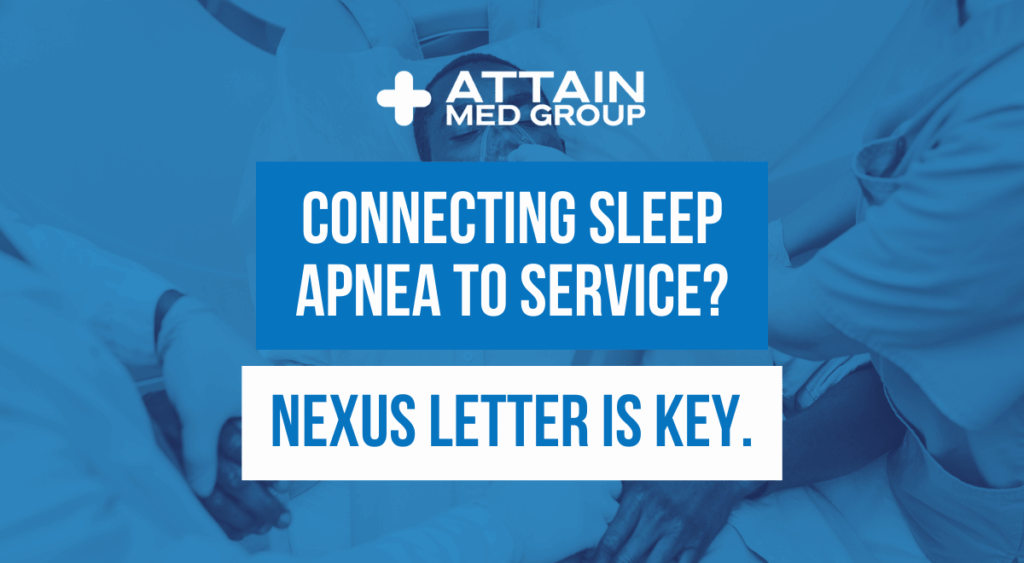Connecting sleep apnea to your service isn’t easy. Learn how a professional nexus letter makes all the difference. Veterans often face an uphill battle when trying to link their sleep apnea to their military service, making it difficult to secure the VA disability benefits they deserve.
If you’re a veteran living with sleep apnea, you are familiar with the daily struggle. You may wake up feeling completely drained, suffer from morning headaches, or find it hard to concentrate. These symptoms can seriously affect your life, and if your condition stems from your time in the service, you are entitled to support.
The core challenge lies in proving that connection to the VA’s satisfaction. This is where a professional sleep apnea nexus letter becomes a critical piece of medical evidence. For many veterans filing a disability claim, this document is the key to a successful outcome.

What Is a Nexus Letter?
A nexus letter is a medical opinion written by a qualified medical professional. It directly links a veteran’s current health condition, such as obstructive sleep apnea, to an event, injury, or illness that occurred during their military service. This document serves as a vital piece of medical evidence in a VA claim.
Think of a nexus letter as a clear and logical bridge. It connects the dots for the VA rater between your military service and your current diagnosis of a sleep disorder. Without this professional medical opinion, the VA may struggle to see the link, potentially leading to a denial of your disability benefits.
This letter is more than just a doctor’s note; it is a detailed analysis based on your medical records and relevant scientific literature. A strong nexus letter uses specific language to state that your condition is “at least as likely as not” related to your service. This phrasing is the standard of proof the VA looks for when deciding on a service connection.

Why Is a Professional Nexus Letter So Important?
You might wonder why your own statements about your health condition are not enough for a VA claim. While your personal testimony is valuable, the VA requires objective, expert medical opinions to substantiate a service connection. A professional sleep apnea nexus letter provides that credible, expert analysis that a VA rater needs to make an informed decision.
A well-written sleep apnea nexus letter strengthens your disability claim in several ways. It provides a clear medical rationale that explains the biological or physiological link between your service and sleep apnea. It also lends credibility to your claim by coming from an impartial medical professional with expertise in the field.
This document can preemptively answer questions or doubts the VA rater might have. A strong nexus can be the single most influential piece of evidence in your file. It often makes the difference between an approved sleep apnea claim and a denial.
Establishing a Service Connection for Sleep Apnea
To receive VA disability benefits for sleep apnea, you must first establish a service connection. A nexus letter is the tool that helps you do this, but you need a valid theory of connection. There are three primary ways to connect sleep apnea to your military service.
Direct Service Connection
A direct service connection is the most straightforward path. This means your sleep apnea began while you were still on active duty. Evidence like in-service complaints of snoring, daytime sleepiness, or a formal sleep study conducted during service can support a direct link.
However, many veterans do not get a sleep apnea diagnosis until years after they have left the military. In these cases, buddy statements from fellow service members who witnessed your symptoms can be helpful. A nexus letter can also bridge the time gap by explaining how symptoms that began in service developed into a diagnosable condition later.

Secondary Service Connection
A secondary service connection is the most common way veterans link their sleep apnea to service. This means your sleep apnea was caused or worsened by another condition that is already service-connected. A strong nexus letter is absolutely essential for proving these complex secondary claims.
For example, it is well-established that conditions like PTSD can lead to weight gain. This weight gain, in turn, is a significant risk factor for developing obstructive sleep apnea. Your nexus letter would explain this chain of causation, connecting your sleep apnea directly to your service-connected PTSD.
Common Conditions for Secondary Service Connection
Many health conditions can lead to sleep apnea. If you are service-connected for any of the following, you may be able to file a claim for sleep apnea secondary to them.
- Post-Traumatic Stress Disorder (PTSD): Chronic stress, certain medications, and weight gain associated with service-connected PTSD can contribute to OSA risk. This also applies to trauma from military sexual trauma (MST).
- Other Mental Health Conditions: Depression, anxiety, and other stress disorders can lead to lifestyle changes, including weight gain, that increase the risk of sleep apnea.
- Rhinitis, Sinusitis, or Deviated Septum: Physical conditions that obstruct the airway can cause or aggravate sleep apnea. Exposure to burn pits or Agent Orange during service can cause these respiratory issues.
- Musculoskeletal Conditions: Chronic pain from back, neck, or leg injuries can lead to a sedentary lifestyle, causing weight gain and contributing to sleep apnea.

What Makes a Strong Nexus Letter?
Not all nexus letters carry the same weight. A strong nexus letter must contain specific elements to be persuasive to a VA rater. Simply having a doctor state a connection is not enough; the opinion must be well-supported and thorough.
1. Credentials Matter
The letter should be from a licensed medical professional with relevant expertise. For a sleep apnea claim, this would ideally be a pulmonologist, sleep specialist, or a doctor who has significant experience with the condition. The expert’s qualifications should be clearly stated in the letter to establish their authority on the subject.
2. Thorough Review of Your Medical History
The medical professional must confirm they have reviewed your complete medical records. This includes your service medical records, VA medical files, and any private medical documents. A comprehensive review demonstrates that the opinion is well-informed and not based on incomplete information.
3. Clear and Specific Language
The letter must be written clearly so a non-medical person, like a VA rater, can understand the reasoning. It should use the specific “at least as likely as not” language to meet the VA’s standard of proof. Vague statements like “it’s possible” or “could be related” are not strong enough to win a disability claim.
4. A Detailed Rationale
A strong nexus letter doesn’t just offer an opinion; it explains the reasoning behind it. It should cite specific evidence from your medical records and service history. For a secondary service connection, it must clearly explain the medical pathway from the primary condition to sleep apnea.
5. Use of Medical Literature
The most powerful nexus letters reference relevant medical studies and scientific research. This shows the VA that the doctor’s medical opinion is supported by the broader medical community. Citing peer-reviewed journals adds a powerful layer of credibility that is hard to dispute.
Understanding VA Ratings for Sleep Apnea
Once you establish a service connection, the VA rates sleep apnea based on its severity. The VA rating determines the amount of your monthly disability benefits. The ratings for sleep apnea are 0, 30, 50, or 100 percent.
The 50 percent disability rating is the most common for veterans with this condition. To receive a 50 percent VA rating, a veteran must have a sleep apnea diagnosis and be prescribed a breathing assistance device. This includes a CPAP machine, which delivers continuous positive airway pressure.
Understanding these ratings helps you know what to expect and ensures your medical evidence, like your disability benefits questionnaire (DBQ), accurately reflects your symptoms. A higher rating can significantly impact your overall combined rating, which you can estimate using a disability calculator.

How to Get a Professional Nexus Letter
Getting a high-quality sleep apnea nexus letter requires a proactive approach. It’s not something you can typically get from a routine doctor’s visit. You need a medical professional who understands the specific requirements of the VA claims process.

1. Find the Right Doctor
Look for a private medical professional who has experience writing nexus letters for veterans. While your VA doctor can provide treatment and document your health condition, they are often unable to write nexus letters. A private physician who is familiar with VA disability claims can offer a more focused and effective medical opinion.
2. Gather All Your Records
Before your appointment, collect all your relevant medical records. This includes your service treatment records, all post-service medical records from the VA and private doctors, and the results of your sleep study. Providing the doctor with a complete file allows them to write a more thorough and accurate letter.
3. Be Prepared for Your Appointment
During your appointment, be ready to discuss your military service and how your symptoms developed over time. Explain any in-service events you believe contributed to your condition. The more details you can provide, the more evidence the doctor has to build a strong nexus.
Common Mistakes to Avoid
When you connect sleep apnea to your service, a few common mistakes can weaken your claim. Avoiding these pitfalls can increase your chances of a successful outcome. Taking the time to prepare correctly makes a significant difference.

1. Using a Non-Specialist
While your family doctor may be supportive, their opinion might not hold as much weight as one from a specialist. The VA gives more consideration to opinions from experts in the relevant field. A letter from a doctor who doesn’t specialize in sleep medicine may be easily dismissed.
2. Providing Incomplete Information
Forgetting to provide the doctor with your complete medical file is a critical error. If the doctor doesn’t have all the facts, their opinion may be based on incomplete evidence. This can lead to a weak or inaccurate nexus letter that a VA rater can challenge.
3. Exaggerating Your Symptoms
Always be truthful about your symptoms and history. Exaggerating your condition can damage your credibility with both the doctor and the VA. Honesty is crucial for a successful and legitimate disability claim.
The Impact of a Strong Nexus Letter
A well-crafted apnea nexus letter can dramatically improve the outcome of your VA sleep apnea claim. It gives the VA rater the clear, evidence-based link they need to approve a service connection. This single document can turn a likely denial into an approval.
Veterans who include a strong nexus letter with their VA claims often experience better results. They may see faster claim decisions because the evidence is clear and easy to understand. More importantly, they have a much higher chance of receiving the VA benefits they are entitled to.
Remember, the VA’s job is to evaluate the evidence you provide. Your goal is to make that evidence as clear and convincing as possible. A professional sleep apnea nexus letter is one of the most effective tools you have to achieve that.

Conclusion
Connecting sleep apnea to your service isn’t easy. Learn how a professional nexus letter makes all the difference. It’s not just another piece of paper; it is a powerful piece of medical evidence that can be the key to winning the VA rating you have earned for your health condition.
Don’t underestimate the importance of a strong nexus in your VA claim process. If you are struggling with sleep apnea and believe it is a result of your military service, getting a professional medical opinion could be the most important step you take.
You served your country with honor, and now it is time to get the care and support you need. A well-supported claim, backed by a strong nexus letter, helps you secure the recognition and benefits you deserve for your sacrifices.

